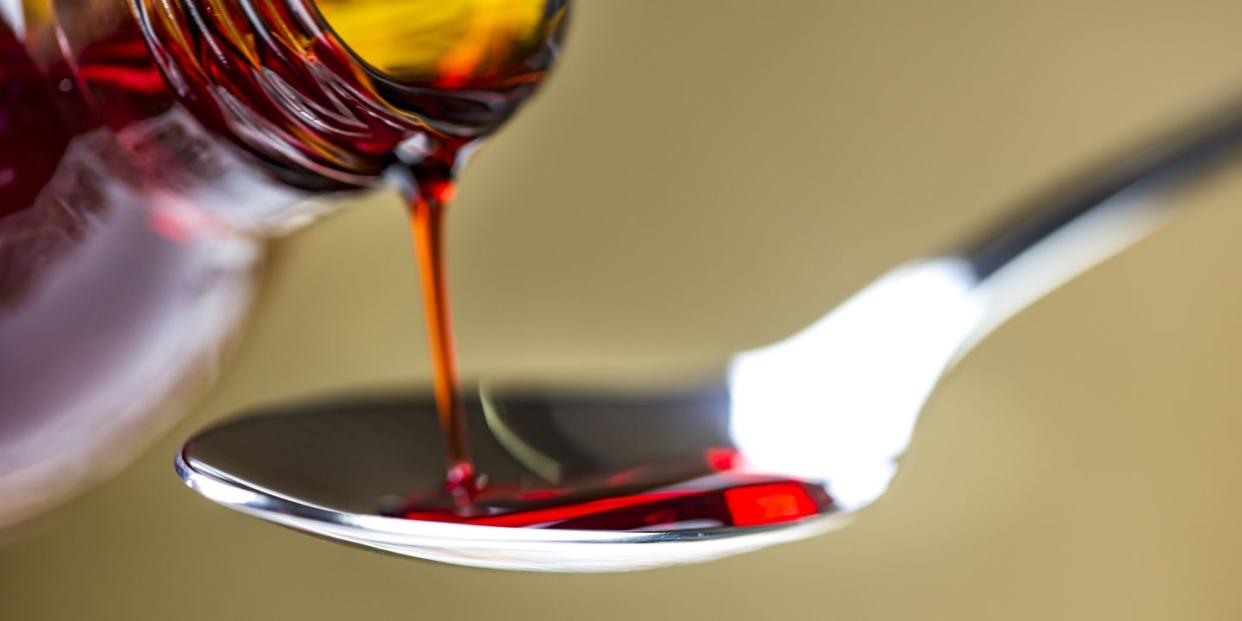People are using apetamin syrup to get 'slim thick' – what is it and is it dangerous?

By this point we're hopefully all pretty clued up on skinny snake oils, like 'flat tummy tea' and 'appetite suppressant lollipops', being complete and utter trash (never mind having potentially harmful side effects, such as negatively impacting your mental health, or acting as a hardcore laxative). Meanwhile, there's now also concern over the rise in drugs like Ozempic (designed for people with type 2 diabetes) being misused for weight loss (by those without the condition). But what about 'weight gain' options, such apetamin?
Apetamin, which is widely available online (we've checked to confirm) and can be purchased typically in syrup form, has been increasingly doing the rounds on social media, with some claiming the illegal supplement has helped them to achieve the much-idolised (and rarely naturally attainable) 'slim thick' body shape. Think: tiny waist, Kardashian-esque bum.
This comes even after reports in 2021 alleged some have come close to death after consuming apetamin – and right now, there remain more than 25,000 posts on Instagram (down from 48,000 posts when last checked in May 2022) that use the hashtag 'apetaminsyrup' (the social media platform said it was making strides to rid the app of harmful, weight-related content).
However, other videos circulating on social media are highlighting the dangers and potential side effects of the supplement, with some users commenting their negative experiences, including one user who wrote: "it almost killed me" and another: "lawd I started having lower back pain [and] come to find out my kidneys were being affected by this product".
Speaking to Cosmopolitan UK about the rumoured – and worrying – rise in apetamin use, leading aesthetic doctor, Dr Osman Bashir Tahir, said he's seen "more and more patients enquiring about the drug", and is keen to break down the full facts about apetamin.
What is Apetamin and why are people using it?
"Apetamin is an appetite stimulating, weight-gain supplement, designed to help people gain weight," the plastic surgeon explains. "It contains cyproheptadine (a medicine that alleviates allergy symptoms, with 'increased appetite' listed as a side effect), lysine and other vitamins."
He notes that it's widely available online, despite being illegal, and has "become popular with social media influencers, who promote it as a quick, non-surgical way of achieving a 'slim thick' hourglass figure".
The combination of lysine (an essential amino acid), vitamins and cyproheptadine hydrochloride is said to act as an appetite stimulant, thus increasing the amount of food you can eat in a day, but Dr Osman outlines that negative side effects can occur. They range from low blood pressure to headaches, to extreme fatigue, and in severe cases, can lead to liver failure or even comas.
"Syrup is the more common way to take apetamin, but the drug also comes in pill form," he notes. "The main difference between the two is that apetamin syrup contains the blend of vitamins and amino acids, while tablets or caplets only contain cyproheptadine hydrochloride."

How can you get a 'slim thick' body without apetamin?
"The best road to an hourglass figure is exercise," says Dr Osman, but of course it's always worth pointing out that you could follow the exact same diet and exercise plan as somebody else, and still end up with entirely different results. Bodies aren't designed – or meant – to all look the same. Also, exercise has a tonne of benefits beyond changing your physique (such as improved mood, better sleep and increased energy levels).
"There are some specific strength training moves you can do that will help you define your shoulders, tighten up your core, and boost the look of your backside to create that coveted hourglass shape," Dr Osman adds, but stresses that if you’re looking to gain weight, it’s always best speak to a dietitian or your healthcare provider to develop a safe and effective plan tailored to your personal needs, rather than relying on illegal supplements.
"Although social media apps all claim to actively be removing content that supports the sale of apetamin, the substance is still readily available online," the medical professional remarks. "I believe it’s highly irresponsible and dangerous for unlicensed influencers and personal trainers to be promoting apetamin or any other dietary supplement."
We have reached out to the manufacturer of apetamin but haven't yet received a response.
Upon asking Meta what it's doing to prevent dangerous weight loss/gain posts, and whether this is why the number of 'apetaminsyrup' posts on Instagram has dropped, a spokesperson said,"We don’t allow the sale of pharmaceutical drugs on Instagram and we remove violating accounts when we become aware of them. Content relating to weight loss products and potentially dangerous cosmetic procedures is restricted for under-18s.
"We’re constantly working to get better at detection and we urge people to report anything they think violates our policies, so we can review it and take action."
They added that Meta's Regulated Goods policy includes a section focused on weight loss products and certain cosmetic procedures across Instagram and Facebook, and as part of that policy it doesn't allow content that attempts to buy, sell or trade pharmaceutical drugs (other than in exception circumstances e.g. listing the price of vaccines in an explicit education or discussion context or offering delivery when posted by legitimate healthcare e-commerce businesses).
If you are affected by weight loss or gain products, help is out there.
Beat is the UK's leading charity dedicated to helping people with eating disorders. If you or someone you know is struggling with body image or eating habits, and want to seek help, call their helpline on 0808 801 0677 or visit their website for more details.
This article is not intended to be a substitute for professional medical advice or diagnosis. Always seek the advice of your physician or other qualified health provider with any questions you may have regarding a medical condition.
You Might Also Like

